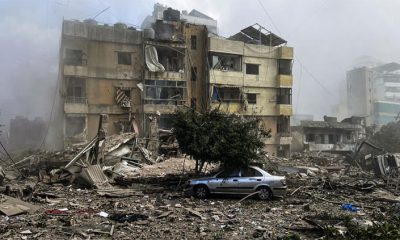World
Why so many mass killings? Families, experts seek answers

More than five years after his son was gunned down in the deadliest mass shooting in modern US history, Richard Berger still asks why.
Why Stephen Berger was killed the day after celebrating his 44th birthday. Why the gunman rained bullets over the Las Vegas Strip in 2017, turning a country music festival into a bloodbath. Why the massacre’s death toll didn’t shock US leaders into doing more to prevent that kind of violence from happening again and again.
Why?
“It’s just a hole in our hearts,” Berger said. “We just don’t know, and we just don’t know what to say.”
For the Bergers, the families of the other 59 victims in Vegas — and relatives and friends of countless others slain in mass killings across the country in the years since — the questions loom just as large now as when the crimes happened. Yet the carnage continues.
Over the first four months and six days of this year, 115 people have died in 22 mass killings — an average of one mass killing a week. That includes the bloodshed on Saturday at a Dallas-area mall where eight people were fatally shot.
The total represents the highest number of mass-killing deaths this early in the year since at least 2006, an Associated Press data analysis shows, and the deaths were already happening at a record pace before the horror unfolded in Texas.
Experts point to a few contributing factors: a general increase in all types of gun violence in recent years; the proliferation of firearms amid lax gun laws; the effects of the coronavirus pandemic, including the stress of long months in quarantine; a political climate unable or unwilling to change the status quo in meaningful ways; and an increased emphasis on violence in US culture.
Such explanations are little comfort not only to the families ripped apart by the killings but to Americans everywhere who are reeling from the cascading, collective trauma of mass violence.
This year’s killings have happened in different ways, from family and neighborhood disputes to school and workplace shootings to explosions of gunfire in public spaces. They’ve taken place in rural as well as urban settings. Sometimes people knew their killers; sometimes they did not.
The bloodbaths are defined by the FBI as mass killings when the events involve four or more fatalities within 24 hours, not including the perpetrator. The Associated Press and USA Today have tracked and compiled extensive data on these violent attacks in partnership with Northeastern University.
The Las Vegas shooter’s motive remains unknown, even now. The high-stakes gambler was apparently angry over how the casinos were treating him despite his high-roller status, but the FBI has never uncovered a definitive reason for the slaughter, which ended with more lives lost than in any single mass killing in decades.
Contributing to 2023′s steady drumbeat of death: the grisly murder-suicide in Utah that left five children, their parents and their grandmother dead just days into the new year; the fatal shooting of six people, including three 9-year-old children, at an elementary school in Nashville; back-to-back rampages in California at dance studios and mushroom farms; and the mall shooting in Allen, Texas, on Saturday, when authorities say a gunman stepped out of a car and immediately started firing at people.
Yet while these tragic events garner an outsize amount of attention in the news media and the public’s mind, they represent only a tiny fraction of overall gun deaths.
Far more frequent are fatal shootings involving fewer than four people and deaths from domestic violence. And then there are the suicides, which make up more than half of the 14,000 gun deaths so far this year, according to the Gun Violence Archive, which monitors news media and police reports to compile data.
Still, mass killings spark the deepest fear in most people’s hearts.
“People around the country all send their kids to schools — and they worry about if they send their kid to school, are they going to get shot?” said Daniel Webster, a professor at the Johns Hopkins Center for Gun Violence Solutions.
The fact is, though they are less common than other gun deaths, the mass killings keep happening — 20 years after Columbine, 10 years after Sandy Hook, five years after Las Vegas, and less than one year after massacres at a supermarket in Buffalo, New York, and an elementary school in Uvalde, Texas.
Which leads back to the same haunting question: Why?
People who study such violence are also perplexed by the sustained pace of the brutality.
“We have plenty of examples of things that seem to be at the breaking point in this country,” said Katherine Schweit, a former FBI executive who created the agency’s active shooter protocol after Sandy Hook. “When I was asked to work on this in 2013, I didn’t ever imagine 10 years later I’d still be working on the same thing.”
It will take years — if it’s even possible — for researchers to pinpoint what’s behind the drastic increase in gun violence. Advocates say there are measures that could perhaps avert such crimes — firearms reform and weapons bans among them — but note there is little appetite on Capitol Hill to implement them.
“I think the United States has a relationship with guns unlike any other country in the world,” said Kelly Drane, research director for the Giffords Law Center to Prevent Gun Violence. “These events are a consequence of our failure to put in place prevention measures.”
President Joe Biden, an ardent advocate of stronger gun control, is frustrated with Congress’ unwillingness to pass a ban on some semi-automatic rifles in the face of the powerful gun lobby led by the National Rifle Association. The NRA did not return an online request for comment.
Lawmakers did pass what, for them, marked a milestone gun violence bill that toughens background checks for the youngest buyers, keeps firearms from more domestic violence offenders and helps states use red-flag laws that enable police to ask courts to take deadly weapons away from people who show signs they could turn violent. Biden signed the bill into law last year.
The legislation and other measures have done little to slow the pace of violence or alleviate the nation’s pain, which has been further exacerbated by the pandemic, climate change and the racial reckoning after George Floyd’s murder by police.
“These tragedies compounded one after the other, making it almost too much to bear,” said Roxanne Cohen Silver, a psychology professor at the University of California, Irvine, who studies coping with traumatic life events.
The mass killings, Silver noted, “Are just another tragedy on top of all of these other psychological and emotional challenges.”
Stephen Berger’s father, Richard, is now 80. He spends his days with his grandchildren — one is a soccer goalie who reminds him of Steve, who had a passion for basketball. Their family awards annual athletic scholarships at Stephen’s high school.
Berger watches the teenagers as they approach the next phase of their young lives, flush with promise and full of life. But his own son is dead, and five years later he’s still left wondering:
Why?
World
Shooting, explosions in Jenin as Israel presses raid

Gunfire and explosions rocked the Jenin area of the occupied West Bank on Wednesday, an AFP journalist reported, as the Israeli military kept up a large-scale raid for a second day.
The operation, launched just days after a ceasefire paused more than a year of fighting in Gaza, has left at least 10 Palestinians dead, according to Palestinian health authorities.
Israeli officials have said the raid is part of a broader campaign against militants in the West Bank, citing thousands of attack attempts since the Gaza war erupted in October 2023.
“The situation is very difficult,” Jenin governor Kamal Abu al-Rub told AFP.
“The occupation army has bulldozed all the roads leading to Jenin camp and to the Jenin government hospital… There is shooting and explosions,” he added, referring to the Israeli military.
Israeli forces have detained around 20 people from villages around Jenin since the operation began on Tuesday, the official said.
An AFP correspondent reported hearing gunfire and explosions from the northern city’s refugee camp, a hotbed of militancy where Israeli forces have carried out repeated raids.
In December, Jenin area militants also clashed with the security forces of the Ramallah-based Palestinian Authority.
‘IRON WALL’
The Israeli military said it was continuing with the operation, dubbed “Iron Wall”, adding that it had “neutralised over 10 terrorists”.
“Additionally, aerial strikes on terror infrastructure sites were conducted and numerous explosives planted on the routes by the terrorists were dismantled,” it said in a statement.
The raid in Jenin aims to counter “hundreds of terrorist attacks, both in Judea and Samaria (the occupied West Bank) and the rest of Israel,” military spokesman Nadav Shoshani said at a press briefing.
He said that since the start of the Gaza war, Israel had seen “over 2,000 terror attack attempts” from the West Bank, adding that the army had “eliminated around 800 terrorists”.
Shoshani said the explosive devices planted along roads had recently killed a soldier in the area.
Islamic Jihad, one of the factions present in Jenin, condemned what it called “the systematic displacement, destruction and killing carried out by the occupation army against Jenin refugee camp”.
The Palestinian Authority’s foreign ministry accused Israel of “collective punishment” and said the raid was part of an Israeli plan aimed at “gradually annexing the occupied West Bank”.
‘DECISIVE OPERATION’
Defence Minister Israel Katz vowed to continue the raid in Jenin.
“It is a decisive operation aimed at eliminating terrorists in the camp,” Katz said in a statement on Wednesday, adding that the military would not allow a “terror front” to be established there.
“It is a key lesson learnt from Gaza… we do not want terrorism to recur in the camp once the operation ends,” he said.
Prime Minister Benjamin Netanyahu said the raid aimed to “eradicate terrorism” in Jenin.
He linked the operation to a broader strategy of countering Iran “wherever it sends its arms — in Gaza, Lebanon, Syria, Yemen” and the West Bank.
The Israeli government has accused Iran, which supports armed groups across the Middle East, including Hamas in Gaza, of attempting to funnel weapons and funds to militants in the West Bank.
United Nations Secretary-General Antonio Guterres called for “maximum restraint” from Israeli security forces and expressed deep concern, deputy spokesman Farhan Haq said.
Violence has surged throughout the occupied West Bank since the Gaza war erupted on October 7, 2023.
According to the Palestinian health ministry, Israeli troops or settlers have killed at least 848 Palestinians in the West Bank since the conflict began.
During the same period, at least 29 Israelis, including soldiers, have been killed in Palestinian attacks or Israeli military operations in the territory, according to Israeli official figures.
World
Saudi Arabia plans 600bn dollars in new US investment, trade over four years

Saudi Arabia Crown Prince and Prime Minister Mohammed bin Salman told President Donald Trump that the kingdom wants to put $600 billion into expanded investment and trade with the United States over the next four years, the Saudi State news agency said early on Thursday.
The crown prince expressed it during a phone call with Trump, who took oath for his second term on January 20.
During the call, the crown prince conveyed the congratulations of King Salman bin Abdulaziz Al Saud and his own congratulations to the President on the occasion of his inauguration, and wished the friendly American people more progress and prosperity under the President’s leadership.
The two leaders discussed ways for cooperation between the Kingdom and the US to promote peace, security and stability in the Middle East, in addition to enhancing bilateral cooperation to combat terrorism.
The leaders also discussed ways to enhance bilateral ties in various areas, and the crown prince noted the US administration’s ability to create unprecedented economic prosperity and opportunity through anticipated reforms in the United States, and that the Kingdom seeks to participate in these opportunities for partnership and investment.
The US president expressed his appreciation and thanked the Saudi leadership for their congratulations, and affirmed his keenness to work with the Kingdom on all that benefits the interests of both countries.
Trump said following his inauguration on Monday that he would consider making Saudi Arabia his first destination for a foreign visit if Riyadh agreed to buy $500 billion worth of American products, similar to what he did in his first term.
“I did it with Saudi Arabia last time because they agreed to buy $450 billion worth of our product. I said I’ll do it but you have to buy American product, and they agreed to do that,” Trump said, referring to his 2017 visit to the Gulf kingdom.
World
US decision to cancel Afghan refugee resettlement exposes Western hypocrisy

An executive order by US President Donald Trump to suspend resettlement of all refugees, including Afghans, for an indefinite period is being seen as a betrayal of those who supported the International Security Assistance Force (ISAF) and NATO in Afghanistan.
Nearly 1,660 Afghans cleared by the US government to resettle in the US, including family members of active-duty US military personnel, are in limbo since the Trump-led administration took extreme decision.
The order has left them stranded while it is expecting from Pakistan, which has hosted millions of Afghans for decades on humanitarian grounds, to share the burden again.
Instead of easing the burden, the US ban has only intensified challenges for Pakistan and other neighbouring host countries.
Furthermore, the western countries, which have been criticising Pakistan for repatriation of illegal immigrants, are refusing to accept refugees by giving lame excuses, abandoning Afghan refugees when they need help the most.
The Human Rights Watch (HRW), the Amnesty International and the EU keep an eye on Pakistan’s policies while there is no focus on the hypocrisy being showed by the Western countries by banning refugees after using them as pawns.
The international community must hold the US and EU accountable for their bans and pressure them to contribute fairly to managing the Afghan refugee crisis.
Trump made an immigration crackdown a major promise of his victorious 2024 election campaign, leaving the fate of US refugee programmes up in the air.
The State Department on Wednesday implemented the order, announcing that all refugee arrivals were indefinitely suspended, all previously scheduled travel cancelled and new refugee applications, as well those in process, were suspended.
-

 Business2 months ago
Business2 months agoAuto industry’s shift toward EVs is expected to go on despite Trump threat to kill tax credits
-

 Entertainment3 months ago
Entertainment3 months agoBeyoncé leads the 2025 Grammy noms, becoming the most nominated artist in the show’s history
-

 Business3 months ago
Business3 months agoWall Street cruises toward the close of its best week in a year
-

 pakistan3 months ago
pakistan3 months agoPM Shehbaz terms promotion of foreign investment as top priority
-

 World3 months ago
World3 months agoSix Israeli troops killed, deadly strikes in Lebanon
-

 Entertainment3 months ago
Entertainment3 months agoMovie Review: ‘Red One’ tries to supersize the Christmas movie
-

 Business2 months ago
Business2 months agoWall Street gains ground as it notches a winning week and another Dow record
-

 Sports1 month ago
Sports1 month agoSouthampton set to sign Juric as new manager

















